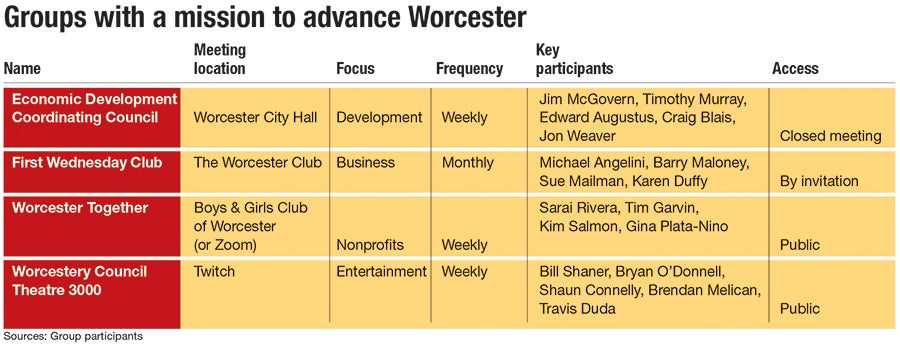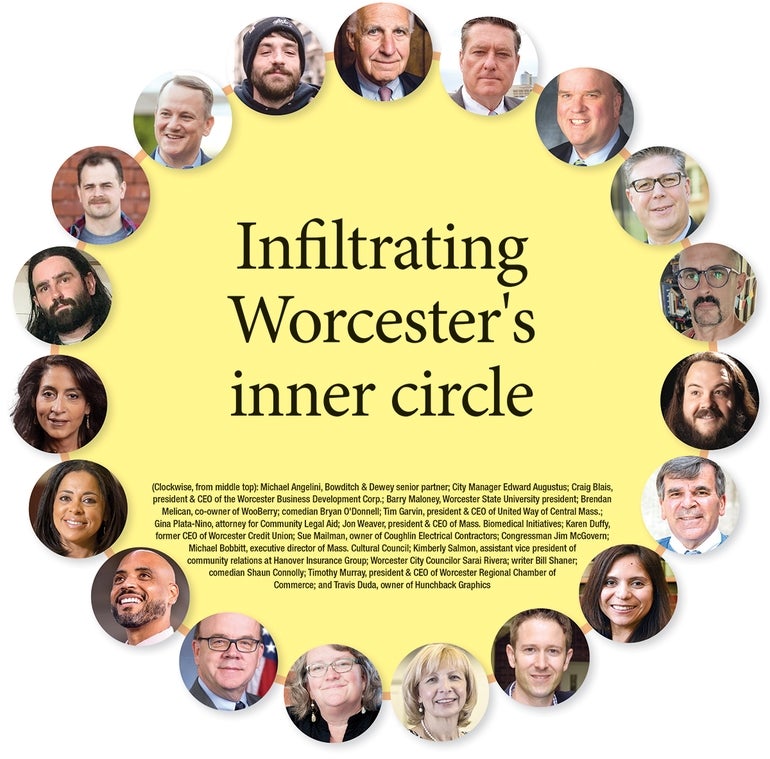Informal meetings take place across Worcester everyday with the express goal of uplifting a Gateway City on the brink of larger economic and cultural significance.
Get Instant Access to This Article
Subscribe to Worcester Business Journal and get immediate access to all of our subscriber-only content and much more.
- Critical Central Massachusetts business news updated daily.
- Immediate access to all subscriber-only content on our website.
- Bi-weekly print or digital editions of our award-winning publication.
- Special bonus issues like the WBJ Book of Lists.
- Exclusive ticket prize draws for our in-person events.
Click here to purchase a paywall bypass link for this article.
Greater Worcester artists crowded around the executive director of the Massachusetts Cultural Council, Michael Bobbitt, on a Friday evening in March, posing pointed questions about nepotism.
“People do business with people they know,” Bobbitt responded without hesitation. “It’s not about nepotism; it’s about building credibility.”
The roundtable discussion aimed to give local creatives a chance to share their challenges and aspirations with Bobbitt, but as the session wore on, the former quickly outweighed the latter. Bobbitt’s advice echoed a favorite adage repeated around Worcester City Hall and by City Manager Edward Augustus: “The world is run by those who show up.”
“You’ve taken the first step, just by coming here tonight,” Bobbitt told the room full of artists, encouraging them to shake hands with eager representatives from the City’s Office of Cultural Development and the Worcester Arts Council. “Let them know you are here. Tell them who you are.”
A few frustrated attendees let out audible sighs through their masks. In a Zoom-ridden age of socially distant civic engagement, it’s easy to see how the value of person-to-person conversations might be lost on those who feel they are on the outside looking in. Nevertheless, in many ways, authentic relationship building has never been more important.
Informal meetings take place across Worcester everyday with the express goal of uplifting a Gateway City on the brink of larger economic and cultural significance. If this comes as a surprise to you, your invitation probably didn’t get lost in the mail. According to many of Worcester’s key authorities, there’s a place at the table for you if you want to be included. You just have to keep showing up.
“Unfortunately, our group has often reflected the old-white-maleness of many of Worcester’s foundational businesses and institutions, but that’s changing. We want people who lead organizations to contribute to our discussions; there are no formal requirements beyond that,” said Michael Angelini, senior partner at Bowditch & Dewey.
Tackling exclusivity
“It’s not like there’s a secret handshake or anything,” said Michael Angelini, senior partner at Worcester law firm Bowditch & Dewey and co-founder of the First Wednesday Club. “But, we try to fly under the radar.”
Angelini began organizing regular gatherings as far back as the 1980s with the help of a former media executive from the Telegram & Gazette who has since moved on.
“Clearly we had no sense of imagination when we came up with the name,” joked Angelini. “We simply met on the first Wednesday of every month.”
From the very beginning, the founders used their monthly get-togethers at The Worcester Club to fill a communication void amongst business leaders, professionals, and academics.
“We all shared a desire to advance the interests of the community,” Angelini said. “This allowed us to explore more non-traditional channels.”
Angelini and Worcester State University President Barry Maloney serve as the current co-chairs of the group, overseeing roughly two dozen participants. Angelini said members float in and out and are invited to attend based on their honest interests in Worcester.
Angelini acknowledges the exclusionary roadblocks, which have hindered the diversity of Worcester’s leadership in the past.
“Unfortunately, our group has often reflected the old-white-maleness of many of Worcester’s foundational businesses and institutions, but that’s changing,” he said. “We want people who lead organizations to contribute to our discussions; there are no formal requirements beyond that.”
Women are increasingly involved in the group, Angelini said. Sue Mailman, owner of Worcester business Coughlin Electrical Contractors and member of the city’s school board, and Karen Duffy, the former CEO of Worcester Credit Union, served as two of the First Wednesday Club’s former chairs.

An honest interest
At a meeting of the First Wednesday Club, Tim Garvin, president and CEO of the United Way of Central Massachusetts, presented his organization’s efforts to support Afghan refugees in Worcester.
Garvin is no stranger to groups like First Wednesday Club, which he views as intent on learning about efforts in the community and opening new lines of communication. One such group he participates in is Worcester Together, which formed in 2017 in response to Hurricane Maria and worked to coordinate services for evacuees from Puerto Rico.
During COVID, Garvin said Worcester Together’s meetings resumed under the development model of “form, storm, norm, preform” and remained open to all individuals wishing to get involved. The group continues to extend weekly invitations on Zoom to approximately 250 community members. Worcester Together has raised and granted approximately $11 million in funding to date.
One Worcester-forward group taking a different tone when it comes to banding together for progress is Worcestery Council Theatre 3000, a live stream of municipal meetings featuring commentary by local entertainers and media personalities. Comedian Bryan O’Donnell credits writer Bill Shaner with bringing the group to fruition in October.
O’Donnell described their five months of biting civic engagement as, “Extremely funny, sometimes mind-numbing (hi, executive session), but above all, just fascinating.”
Like the First Wednesday Club and Worcester Together, Worcestery Council Theatre 3000 attracts those with an honest interest in Worcester, O’Donnell said.
“Since last fall we've learned that sometimes, better things are possible in Worcester, and we do hope we can have even the smallest influence on that,” O’Donnell said, adding the opportunity to heckle city officials makes up for punishing moments of municipal minutiae.
Those aforementioned city officials have their own extracurricular meetings, beyond the regular workday. The Economic Development Coordinating Council, established by Congressman Jim McGovern and Timothy Murray during Murray’s tenure as lieutenant governor, brings together the city’s government and business powerbrokers in a Friday morning meeting at City Hall.
“Originally, we wanted to collectively promote our city and make sure programs were being adequately utilized and not replicated,” said Murray, who is now president and CEO of the Worcester Regional Chamber of Commerce.
Craig Blais, president and CEO of the nonprofit Worcester Business Development Corp., has been a part of the EDCC since day one.
“The Economic Development Coordinating Council has proven to be a valuable development tool and clearinghouse to communicate goals and strategies on complex development projects,” Blais said. “It allows for coordinated priorities to be advanced with grants, incentives and permitting assistance for developers interested in investing in Worcester.”
This coordination helps Worcester get to the front of the line for government assistance, said Jon Weaver, president and CEO of Worcester incubator Massachusetts Biomedical Initiatives.
“Whenever we connect with outside developers or our state and federal partners, they note how well Worcester collaborates and gets along,” Weaver said. “That’s not an accident, it comes from our commitment to communicating, partnering, and prioritizing how we advance economic development in the city.”
Showing up for Worcester
There’s no denying Worcester’s powerbrokers do not accurately reflect the community’s demographics. Consequently, the onus of inclusion should not fall on underrepresented folks who already feel left out of the conversation. Major stakeholders need to be proactive about inviting minority groups in.
Nevertheless, it bears mentioning that infiltrating Worcester’s inner circle is probably easier than most people think.
Before railing against the insular power structures preventing you from getting involved, try dropping Angelini, Garvin, O’Donnell, or Murray a line. Despite their undeniable white maleness, each of these leaders is looking to make strides for Worcester, and they claim they’ll take all the help they can get.
Put them to the test. Introduce yourself with a handshake. Make sure they remember your name. As Bobbitt so aptly put it, “People do business with people they know.”

